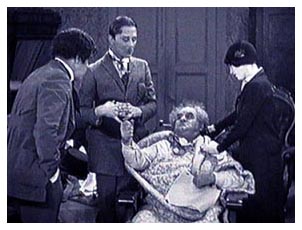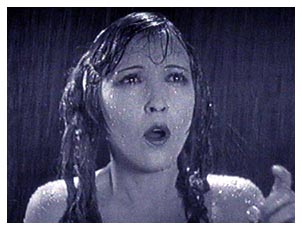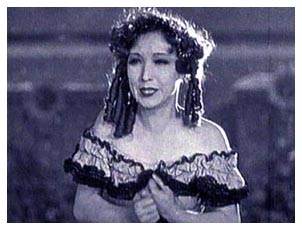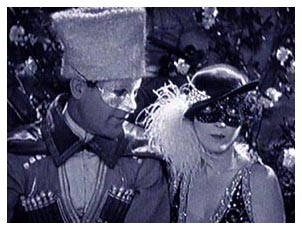

Columbia
Cast: Bessie Love (Ginger Bolivar), Johnnie Walker (Don Wilson/Harry
Mann), Lionel Belmore (Jasper Bolivar), Ernest Hilliard (Arnold
Wingate), David Mir (Eric Barrymaine)
Don Wilson is a famous black face Broadway entertainer who
gets 500 letters a day from women admirers. He's tired and wants
to go to the country for a rest. He  and
his producer happen upon a traveling tent show troupe who are
putting on a Civil War melodrama in the "sticks." Old
Jasper Bolivar, who boasts of acting with Booth, wrote the production
and owns the troupe. His pretty daughter, Ginger, plays two parts
in the play, directs and generally tries to keep the whole affair
up and running. At the last minute, she needs someone to play
a dying soldier, and, having no idea who Don is, recruits him.
He goes along and falls for the girl. Although the troupe performs
with all of the seriousness and sincerity they can muster, Don
and his producer think the production is so "cornball"
that it would be a comedy hit on Broadway. The producer offers
Bolivar a Broadway contract, which he readily accepts, but fails
to tell the old man that they will be offering it as a comedy.
Don goes back to New York with the troupe posing as Harry Mann
and keeping the fact that he's a famous Broadway star a secret.
When the production brings nothing but laughs on Broadway, the
whole troupe is hurt and heartbroken, and Ginger bawls out the
entire audience, who, still thinking this is part of the comedy,
continue to laugh. To further add insult to injury, Ginger finds
out who Harry really is and that he was a part of the deception.
She, her father, and the troupe return to the small towns where
they are appreciated. Don has fallen in love with her, though,
and decides he must go to her.
and
his producer happen upon a traveling tent show troupe who are
putting on a Civil War melodrama in the "sticks." Old
Jasper Bolivar, who boasts of acting with Booth, wrote the production
and owns the troupe. His pretty daughter, Ginger, plays two parts
in the play, directs and generally tries to keep the whole affair
up and running. At the last minute, she needs someone to play
a dying soldier, and, having no idea who Don is, recruits him.
He goes along and falls for the girl. Although the troupe performs
with all of the seriousness and sincerity they can muster, Don
and his producer think the production is so "cornball"
that it would be a comedy hit on Broadway. The producer offers
Bolivar a Broadway contract, which he readily accepts, but fails
to tell the old man that they will be offering it as a comedy.
Don goes back to New York with the troupe posing as Harry Mann
and keeping the fact that he's a famous Broadway star a secret.
When the production brings nothing but laughs on Broadway, the
whole troupe is hurt and heartbroken, and Ginger bawls out the
entire audience, who, still thinking this is part of the comedy,
continue to laugh. To further add insult to injury, Ginger finds
out who Harry really is and that he was a part of the deception.
She, her father, and the troupe return to the small towns where
they are appreciated. Don has fallen in love with her, though,
and decides he must go to her.
What a treasure! Yes, that's the perfect word. A treasure is usually something you find, and this delightful film was discovered in the Cinématheque Francaise in 1996 after being considered lost for almost 70 years! The next year, "The Matinee Idol" was broadcast on TV and seen by the general public for the first time since 1928. The DVD release, which includes the documentary "Frank Capra's American Dream," is a truly a treasure for silent movie fans.
The New York Times (April 24, 1928) review said,
"This picture makes no pretentions of doing anything save
tell a pretty little story, consequently is succeeds quite admirably,"
and this is a good summation of what the first-time viewer should
expect of "The Matinee Idol." It does "succeed
quite admirably," and is, therefore, a  very
entertaining 55 minutes (Variety lists the original running
time as 66 minutes). Harrison's Reports (April 7, 1928)
noted that "The interest is maintained fairly tight from
the beginning to the end."
very
entertaining 55 minutes (Variety lists the original running
time as 66 minutes). Harrison's Reports (April 7, 1928)
noted that "The interest is maintained fairly tight from
the beginning to the end."
The picture has no dull moments, no breaks in the pacing, or lulls in the interest. It moves along briskly from one segment to the next with logic and economy of time. Even the repeat of the hokey Civil War performance has enough variety thrown in when it is repeated later in the film to hold the viewer's interest. One would think that seeing the same act twice in a 55-minute film would be a bit much to sit through, but director Frank Capra has constructed the film in such a way that the tone and mood are totally different the second time around.
In the first, we see the performance strictly from a comedic standpoint. The troupe is playing it straight, but we know it's corny and, therefore, funny. The second time when the play is performed on Broadway, yes, there is humor, but there is pathos, too. A romance has developed between Don and Ginger, and we, the viewers, know that she is heading for a major heartbreak when she realizes their "serious" play is being presented for people for laughs.
All this time, too, Don has maintained his secret identity because Ginger has only seen him as Don Wilson in blackface. She hasn't yet made the connection that Don Wilson and the inept extra in her play, Harry Mann, are one and the same. The tension and anticipation, coupled with the comedy, take the viewer on an emotional ride that keeps his or her eyes glued to the screen.
Bessie Love plays the scene where she realizes the audience
is laughing at their performance extremely well. Their big night
on Broadway, that should have been their crowning moment, turns
into their most humiliating moment. After bawling out the audience,
who still continue to laugh at her, Ginger runs outside - in her
very large, period hoop skirt - into a dark alley and the pouring
rain. Don, in blackface, runs after her. Staging this in the
pouring rain provides the perfect dreary backdrop for such an
emotional scene, but Capra also wisely uses it for an even more
practical purpose. As Don is trying to console the inconsolable
Ginger, the  rain begins to wash
the black from his face. Suddenly, Ginger realizes that Don and
Harry are the same person. The man she gave her heart to turns
out to be the one who deceived her and knowingly placed her and
her beloved troupe in this humiliating situation. Pretty emotional
stuff for a "little" film from a poverty row studio.
rain begins to wash
the black from his face. Suddenly, Ginger realizes that Don and
Harry are the same person. The man she gave her heart to turns
out to be the one who deceived her and knowingly placed her and
her beloved troupe in this humiliating situation. Pretty emotional
stuff for a "little" film from a poverty row studio.
Variety (April 25, 1928) said, "A few more thousands spread between production and cast would have made this one worthy the deluxe sites across the country." Whether a heavier investment on production would have sold the movie into more theaters can only be conjectured; that it would have improved the film is highly doubtful. We must keep in mind what is being presented in the story. A traveling tent troupe barely making enough pennies and nickels to get by wouldn't have an elaborate set. The "ruralness" of the location and even the poverty of the Jasper troupe are well represented. The New York theater is convincing enough as a Broadway venue. As for the audience in the Broadway theater, Capra didn't try to impress us with "a cast of thousands," but he did provide a sufficient number to be convincing.
Variety's proposal that more should have been spent on the cast takes some much-deserved credit away from the actors in this film, too. No one could have done a better job than Bessie Love. She was a respected actress who had been around since the D.W. Griffith days. Her impressive credits include everything from "Intolerance" (1916) to "The Lost World" (1925) and beyond. She made nearly 80 films during the silent era, and then, when MGM decided to make its first musical, those chose Love as one of the two leads. Her diminutiveness and feistiness make her perfect for the part of the all-inclusive director, lead actress, casting director, bookkeeper and taskmaster who holds this rag-tag troupe together. Love was no amateur when it came to emotion, either. As mentioned, she is very convincing at being both hurt and angry when she bawls ot the Broadway audience for laughing at their play. She wrings every ounce of sympathy from the viewer, too, as the rain and tears mix in the dark, rain-soaked alley outside the theater.
 Lionel Belmore was perfect casting
for the nearly useless Jasper Bolivar, Ginger's father. The play
was his creation, but it's obvious his talent as a playwright
was about 50 years behind the times. His organizational skills
are almost nil, and we realize the troupe would be nothing if
he didn't have such a "take charge" daughter. So, Belmore
elicits our sympathy, too. This is particularly true at the Broadway
performance of his play. He has been left at the rooming house
because he is sick. After all the others have gone to the theater,
he sneaks out, script in hand, and goes to the theater where he
sits with the audience. We see the pride in his face at the very
thought of his play being performed on Broadway. We also see
the dejection and sadness as he glances around, deep hurt on his
face, as everyone sitting around him laughs at the performance.
Finally, he gets up, slowly, heartbroken, and leaves before the
show is over. Back at the rooming house, he sits in his chair,
alone, unmoving. Ginger comes in after leaving Don in the rain-soaked
alley, and tries to deceive her father into believing the show
was a great success. He finally turns to look at her and tells
her he was there. They embrace as the scene fades.
Lionel Belmore was perfect casting
for the nearly useless Jasper Bolivar, Ginger's father. The play
was his creation, but it's obvious his talent as a playwright
was about 50 years behind the times. His organizational skills
are almost nil, and we realize the troupe would be nothing if
he didn't have such a "take charge" daughter. So, Belmore
elicits our sympathy, too. This is particularly true at the Broadway
performance of his play. He has been left at the rooming house
because he is sick. After all the others have gone to the theater,
he sneaks out, script in hand, and goes to the theater where he
sits with the audience. We see the pride in his face at the very
thought of his play being performed on Broadway. We also see
the dejection and sadness as he glances around, deep hurt on his
face, as everyone sitting around him laughs at the performance.
Finally, he gets up, slowly, heartbroken, and leaves before the
show is over. Back at the rooming house, he sits in his chair,
alone, unmoving. Ginger comes in after leaving Don in the rain-soaked
alley, and tries to deceive her father into believing the show
was a great success. He finally turns to look at her and tells
her he was there. They embrace as the scene fades.
Johnnie Walker wasn't a major star during the silent era, but he was a busy one beginning his career in 1915 and making over 50 films during the silent era. His engaging smile and good looks made him a likeable leading man, and he did a very commendable job of handling the comedy in "The Matinee Idol," too. The reluctance he exhibits at bringing Ginger's troupe to New York under false pretenses is believable, but we also wonder why he did such a good job of going along with it, too. His antics as Harry Mann on stage to miss cues and "ham it up" for laughs are a little difficult to understand if he truly cares for Ginger the way we are led to believe.
David Mir is probably not a name that is on the tips of most silent film buffs' tongues, but he does a commendable job of adding comedy to the film as the effeminate Eric Barrymaine - the leading man in Bolivar's Civil War melodrama. He does not overplay the part, and his loyalty to Ginger and the troupe make him a very likeable character in the story.
Frank Capra's fame is well-known, although it's based almost entirely on his sound films which include such classics as "It Happened One Night" (1934), "Mr. Smith Goes to Washington" (1939), "Meet John Doe" (1941) and "It's a Wonderful Life" (1947). He is probably best known for his work with Harry Langdon as director on "The Strong Man" (1926) and "Long Pants" (1927). Two of his films made at the poverty-row Columbia studios that are available for home viewing, "That Certain Thing" (1928) and "The Matinee Idol" (1928), show that even with a small budget, Capra could work magic. Keep in mind that "It Happened One Night" was made for Columbia, and it won the best picture Oscar.
Admittedly, "The Matinee Idol" couldn't be expected to win Capra any Academy Awards, but it is one of those "you gotta see it" films.
Copyright 2006 by Tim Lussier. All rights reserved.